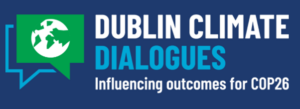The Dublin Climate Dialogues took place last month (May) and brought together an impressive array of speakers including,
- John Kerry (U.S. Special Presidential Envoy for Climate)
- Damilola Ogunbiyi, (Special Rep of the UN Secretary-General for Sustainable Energy)
- Mary Robinson, (former President of Ireland and Adjunct Professor for Climate Justice in TCD)
- Dr Fatih Birol (Director, International Energy Agency) and
- Rabia Ferroukhi (Director, International Renewable Energy Agency (IRENA), amongst many others.
The dialogue sought to scale up ambition before the COP26 summit in Glasgow next November.
In particular the dialogue sought to forge a declaration on how to turn net-zero pledges into concrete energy policies and actions as well as setting out how global energy systems should be recast to facilitate net-zero.
The organisers have described the declaration as “a distillation of the collective wisdom which emerged from our deliberations”
Antaris have summarised the main thrust of the conclusions in the following themes, Fair, Fast and Finance:
Make it Fair
- Deliver a just transition, acknowledging that the most vulnerable, who have contributed the least to global emissions and who also risk enduring the worst impacts from climate change must have their needs met.
Make it Fast
- Electrify the global economy fast, including by quadrupling the installed renewable energy generation annually
- Make sure every country has a “just” plan to transition from fossil fuel plan by 2025 and implementation it through 2030
- Phase out power generation from coal by 2030 and gas before 2040
- Put policies in place to enable countries to accelerate their transition to net zero and to mentor others, working with both State and non-State actors, to go further, faster
Use finance to accelerate the transition
- Eliminate fossil-fuel subsidies in globally by 2025
- End export finance for fossil fuel projects, particularly coal extraction and the building of new coal and gas fired generation
- Accelerate investment flows into communities finding it hard to transition from fossil fuels
- Have a strong carbon price to incentivise the acceleration of transitions from fossil fuels
- Use border adjustments to avoid emissions-heavy manufacturing moving to avoid carbon taxes
The ambition is to be welcomed, as is the recognition of the unprecedented speed scale and depth of the transition needed, but we will have to await the outcome of the agreements resulting from COP26 in Glasgow this November to see if they are adopted globally.
The Dublin Climate Dialogue declaration and the conclusions can be viewed at can be viewed at https://dublinclimatedialogues.com/ and the conclusions are copied below for your convenience.
First
- A commitment by the participants at COP26 to the rapid electrification of the global economy including the quadrupling every year of installed renewable energy generation.
- A commitment to a just transition from fossil fuels, with a plan for every country in place by 2025 and execution through 2030.
- A commitment to eliminating fossil-fuel subsidies in every country no later than 2025.
- A commitment to phasing out coal power generation in every country by 2030 and natural gas power generation in that decade.
- A commitment to ending export finance for fossil fuel projects, particularly coal extraction and the building of new coal and gas fired generation.
- A commitment by our multilateral Institutions to the development of regulatory and funding solutions to enable the acceleration of new grid infrastructure to be the backbone of the transition to a global clean energy economy.
Second
- A commitment to deliver a just transition by recognising and addressing the needs of poorest and most vulnerable who have contributed the least to global warming but who risk suffering its worst effects.
Third
- A commitment to the rapid introduction of global reporting and accounting measures to best reflect the potential impact of climate risks to countries, communities, and companies. This includes stress-testing national and international Institutions on their response to systemic shocks to global and regional markets caused by increasingly significant climate damage.
- A commitment by the world’s multilateral financial bodies, the private sector and individual citizens to accelerate investment flows into communities that may struggle to transition from fossil fuels, coupled with a commitment to reduce the regulatory burdens on those State and non-State actors who wish to move further faster to build resilient communities powered by clean energy.
Fourth
- A commitment to the delivery of public policy pathways that will enable countries who wish to accelerate their transition to net zero to do so, and further to enable and encourage those countries to mentor others, working with both State and non-State actors, to go further, faster.
- A commitment to enable cross-border solutions including putting a strong price on carbon, the introduction of national and international carbon price floors and other mechanisms to incentivise the acceleration of transitions from fossil fuels, whether by governments, communities, or individuals.
- A commitment to introduce border adjustments to further incentivise the transition from emissions-heavy manufacturing.



